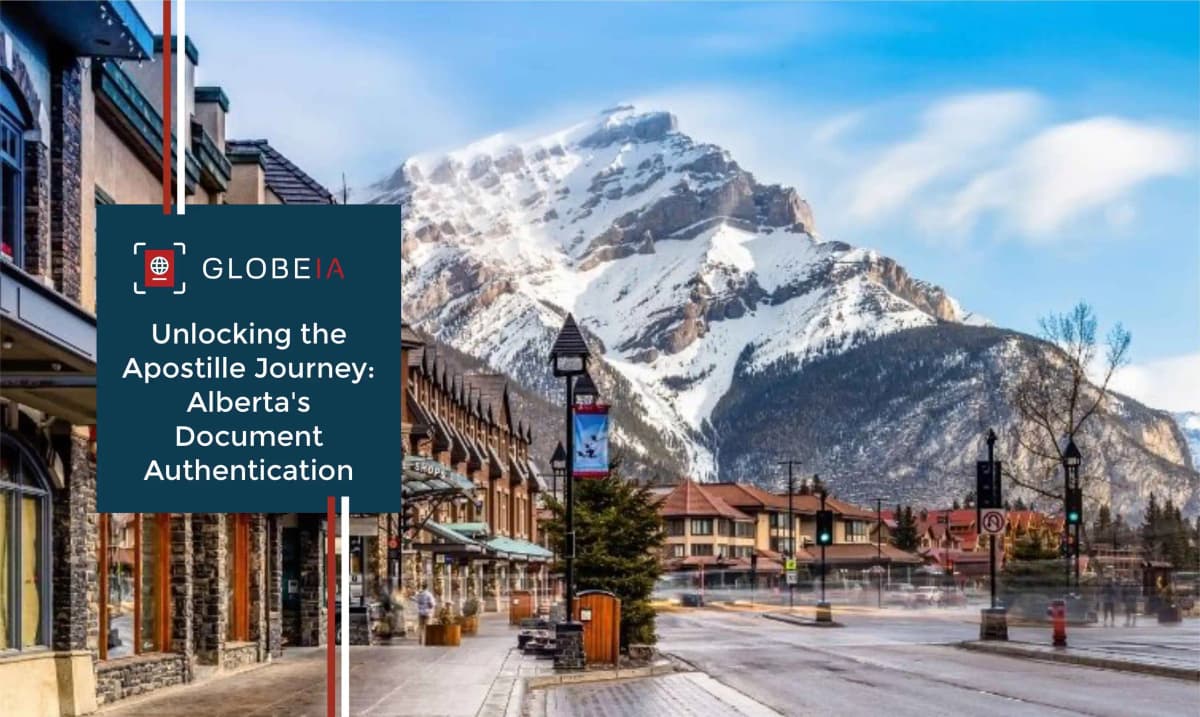
Former Alberta residents often have to get their documents authenticated for use in other countries. The Apostille process is used to authenticate Alberta-issued or notarized documents ever since Canada became a Hague Convention member in early 2024. However, it is always a good idea to confirm with the receiving country’s embassy or consulate to see if they accept apostilled documents.
Former Alberta residents often have to get their documents authenticated for use in other countries. The Apostille process is used to authenticate Alberta-issued or notarized documents ever since Canada became a Hague Convention member in early 2024. However, it is always a good idea to confirm with the receiving country’s embassy or consulate to see if they accept apostilled documents.
This blog post will provide you with a detailed roadmap to follow when getting your provincial documents apostilled from Alberta. After apostille verification, your documents can be used in your destination country if it is part of the 1961 Apostille Hague Convention. We will also discuss the common document types that we receive for Alberta apostille here at Globeia, to help you identify which of your documents will need to be authenticated.
Notarization is an important requirement before the apostille of some of your Alberta documents. This involves getting a notarial certificate for your document which will be checked by the Ministry of Justice before they issue an apostille.
Notary publics are government-appointed officials with the powers to witness document signing and verifying signatures on documents. The notarization process in Alberta is pretty straightforward as you simply have to find a notary public near you. They usually offer their services at banks, law offices, and courthouses. You will have to take your original document and a valid government-issued ID to your notarization appointment. The notary will begin by verifying your identity and then witness the signing of the document before certifying it with their stamp.
You can also use Globeia’s Canadian notarization service to get your documents notarized for the apostille process. We offer both in-person and e-notarization options to make the process convenient and affordable for you. You can opt for the e-notarization option if you are already in your destination country but need to get your documents notarized.
The next step is submitting your documents to the Alberta Ministry of Justice for the apostille. Unlike Manitoba, Yukon, and a handful of other territories, Alberta has its own apostille authority. So, you will not have to contact Global Affairs Canada to apostille documents that were issued or notarized in the province.
Walk-in appointments are not available at the Ministry of Justice’s office at this time so you will need to mail or courier your application along with the document that you are looking to get apostilled.
The Ministry of Justice uses an Apostille Request form that requires your basic details such as First name, last name, province, address, phone number, and shipping details for sending the apostilled documents back to your address. The form also includes a cover letter section where you will need to specify the type of document, along with the total number, and the name of the country where you plan on submitting it.
Public Documents
Wallet-sized versions of vital statistics records are not apostilled by the Ministry of Justice, Alberta. Similarly, laminated documents are not accepted so you must ensure that you submit the polymer paper version of your birth certificate. A new vital record can be obtained by submitting an application to a registry agent.Divorce Certificates
An additional step is required in the case of divorce certificates. You will need to get your divorce certificate signed by your respective county’s clerk. An impressed court seal must also be impressed as final verification before apostille submission.Educational RecordsEducational records, such as college, school, and university transcripts can be obtained by contacting your respective educational institute. The institute’s relevant official must also certify the record and state whether it is an original document or a true copy of the original.Other DocumentsPowers of attorney, invoices, export letters, and corporate documents require notarization. We recommend checking if the document has been signed, stamped, and dated by your notary before you send it in for apostille. At Globeia, we have seen many cases where an apostille request ended up getting rejected because the document was not notarized properly.Now you must be wondering how you are going to complete all of these steps on your own. We have just the solution for you with our all-inclusive Canadian apostille service. We accept applications from both inside and outside Canada for both federal and provincial documents.
To start, simply create an account on our portal and add your details with a few simple clicks. We will go through your request and help you mail your documents to our office where your application will be completed and forwarded to the Ministry of Justice, Alberta. Globeia’s experts can also authenticate and legalize your Alberta documents if you plan on using them in a non-Hague country. Use the contact form below to let us know about your documents or visit our Canadian Authentication and Legalization page for more information.
“Curated insights and top reads handpicked for the Globeia community.”



Have questions or need support? Our team is here to guide you through secure, reliable background checks—anywhere in the world.
![]() Canada
Canada
1185 Victoria Park Avenue, Toronto, ON, M4B 2K5
![]() USA
USA
251 Post Street, Unit-300, San Francisco, CA, 94108


Need help with your application or background check?
Contact us now and speak with a dedicated Globeia expert today.